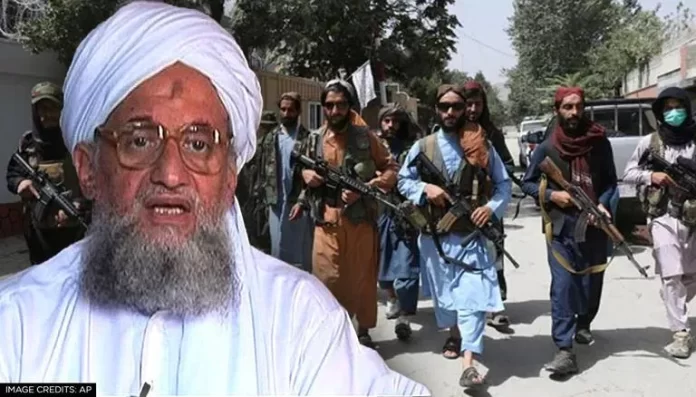One of the world’s most wanted terrorists and the leader of al-Qaeda, Ayman al-Zawahiri was killed by the United States through a drone strike in Kabul on 31st July 2022. Often regarded as the mastermind behind major attacks by al-Qaeda such as 9/11, he became the leader of the group after the death of Osama bin Laden.
According to observers, Ayman al Zawahiri strengthened the ideological bases of al-Qaeda and developed an effective bureaucracy while bin Laden acted as the public face of the group. Undoubtedly, the drone attack will deteriorate the ties between Washington and Kabul and might set the future for more of Washington’s drone operations. However, it is believed that the death of al Zawahiri may not influence al-Qaeda to a massive level despite Zawahiri being a prominent member of the group.
Although Zawahiri strengthened the bases of al-Qaeda and played a key role in extending the reach of the organization, he was not as charismatic as Osama bin Laden. He was often seen as a “grey bureaucrat” and it was during his tenure, that the grip of al-Qaeda in regions such as Africa, Asia, and the Middle East weakened. He was a figurehead but failed the task to prevent the splintering of the Islamist movement in Syria and other conflict zones after the Arab Spring started in 2011. The emergency of ISIL during his tenure as a breakaway part of al-Qaeda is a point to wonder. Given such a reputation, it is uncertain whether his death would ignite a significant change in the organization or would shift the regional power bases.
One of the major driving forces of al-Qaeda is its effective and operational bureaucracy. After the death of bin Laden, al-Zawahiri played a key role to develop an efficient and inclusive bureaucratic system with clear chains of command to ensure that the group is not solely dependent on its leader, even al-Zawahiri himself. With the concept of “franchising”, which was adopted during Zawahiri’s tenure, al-Qaeda rapidly expanded its reach to areas where it was not operating before. The expansion reached areas such as Kashmir and Mali with the addition of autonomous groups often referred to as “franchises”. Surprisingly, these groups have sustained the ability to work independently without much intervention from the center. It signals that al-Qaeda has a vast network with a clear system and regulations developed over the period of time that would not allow it to disintegrate after the death of al-Zawahiri.
Moving on, it is the ideology of every organization that sets up the stage for the group to operate successfully. In the case of al-Qaeda, the violent ideology of the group is not solely linked to any leader although Zawahiri played a key role to build the ideological foundations of the group. The ideology of al-Qaeda is a binding force that keeps groups united despite having geographical and other physical barriers. The set ideas of al-Qaeda existed long before al-Zawahiri and they will remain constant no matter if it fails in some part of the world or its leader is killed. Al-Zawahiri was not the only one to ensure the expansion and reach of the group rather it is driven by a strong framework of ideas. The ideology of al-Qaeda will always get support no matter what happens to its leaders and it indicates that the killing of al-Zawahiri would have little impact on the group opposite to the anticipation and expectations from the west.
Unlike the leaders of other groups such as Abu Bakr al Baghdadi and Abu Musa al Zarqawi, al Zawahiri was a pragmatist and a rational leader who did not take a harsh stance against the local armed groups. He relied on the notion of cooperation instead of sheer dominance over the local armed groups as evident in the case of other organizations. Due to this lenient stance, al-Qaeda enjoyed massive communal support during al-Zawahiri’s tenure in areas where it was active. This strategy allowed the group to expand in Syria and sub-Saharan Africa. The policies of Al-Zawahiri enabled Al-Qaeda to bridge gaps in Africa as it formed alliances with local political groups and gathered the support of local clan leaders, nomads, and other people. These policies of Al-Zawahiri increased the reach as well as the power of al-Qaeda however the emergency of ISIL as a breakaway part of Al-Qaeda did more damage to the group as compared to the death of its leader. ISIL was not only a rival group of al-Qaeda rather it recruited the members of Al-Qaeda and created a state-centric idea. This separation is termed the biggest failure in the tenure of Al-Zawahiri. The communal support it has obtained through the years will not fall apart after the assassination of its leader rather it can play a major role to dwarf the succession crisis. Thus, Al-Zawahiri’s death is a setback to al-Qaeda as he was a key personality of the group but it is very unlikely to ignite a crisis inside the group.
To conclude, the drone attack in Kabul on 31st July that led to the death of al-Qaeda’s leader al-Zawahiri took the world by surprise as it nullified the claims of the Taliban government in the country. It was indeed a movement of sadness for the terrorist group but a critical evaluation of the group’s journey predicts that it would not fuel any massive crisis. It was al-Zawahiri who led the foundations of organizational bureaucracy, cemented the ideological bases, and gained communal support for the group and these are the elements to help the group survive after his death. The coming few days are crucial for the future of al-Qaeda but a rational analysis of the affairs hints that the group has the capability to tackle the loss and move ahead. Thus, al-Zawahiri’s death is a great loss to al-Qaeda but the possibility of a crisis in the group afterward does not seem rational as al-Qaeda has a strong ideological base and operational bureaucracy.




